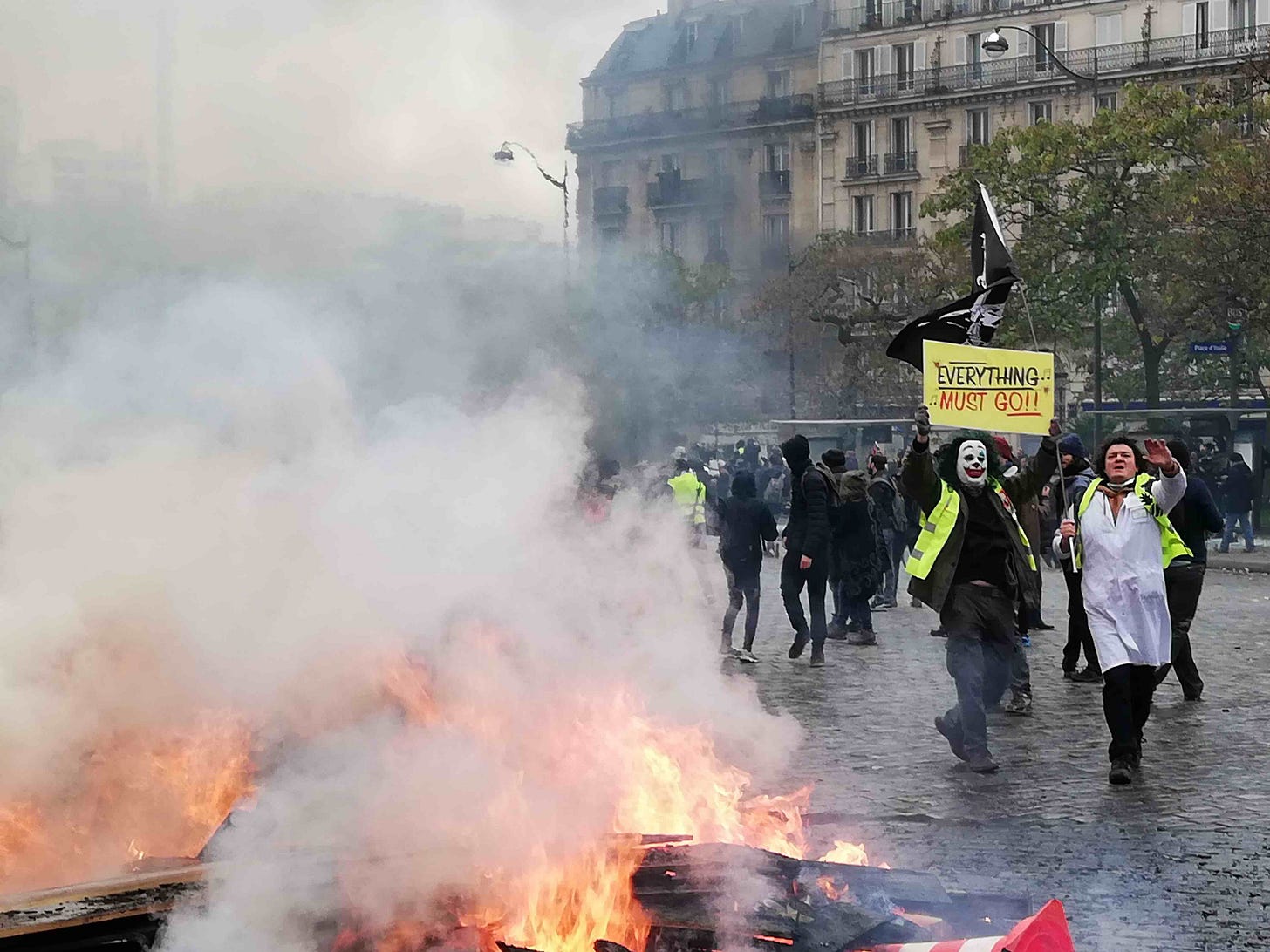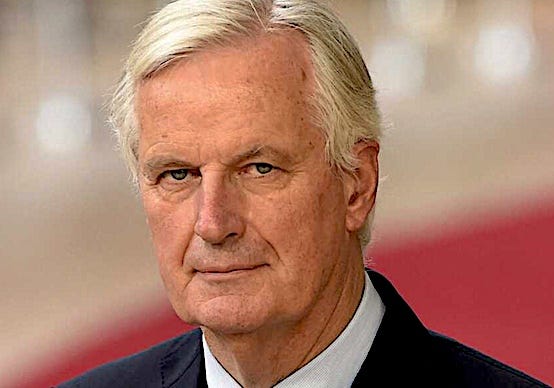Boiling Frogs in Europe
Chaos in the Continent's Kitchen
Maybe I’m not so good as I seem to you. I’ve a bad heart; I will have my own way. Dostoievsky, Brothers Karamazov
Post Election Machinations in France
Seventy five days after the July elections, the French have a new Prime Minister : Michel Barnier, a vieux papi of the old school, a Maastricht Man. Barnier has no majority in the country’s lower house, the National Assembly, and is currently trying to cobble one together with right-wing parties. He might not last the week.
A quick look back: in June, Macron’s Renaissance party took a beating in European Parliamentary elections. In response, Macron dissolved the French Parliament. But wait. While European Parliamentary elections are proportional, French elections are First Past the Post in two rounds, the first for protest, the second for choice. Rassemblement National (RN), the Le Pen family business, trounced everyone in the first round. Merde ! The country is going fascist. Would Jordan Bardella, that untested product of the tough Paris suburbs, be the new Prime Minister ?
Macron’s center and the New Popular Front (NFP) on the left made common cause to defeat the RN in the second round, with all parties finishing far short of the necessary 289-seat majority. Chaos, negotiations ongoing. The Left, in the lead with just under 200 seats, claimed the right to name a Prime Minister. Macron called time out for the Olympics, of all things. One sporting event at a time ! In late August he rejected the NFP’s candidate, Lucie Castets, and spent early September interviewing candidates, all of whom passed on the job.
Barnier, the Euro-establishment in person, a Polonius who has been of some service to the state, is a genial, shadowy figure who never quite goes away. In his early seventies now, he will be forever remembered as the Foreign Secretary who overturned the popular will when the French rejected the Maastricht Treaty in 2005. Maastricht is the European Union’s constitution, rammed through despite opposition in France, Holland and Portugal. Our current unelected dictator is the remorseless Ursula von der Leyen.
NFP members and dissident conservatives, all those thrown overboard on the RN’s long march to power, are circulating a petition aimed at forcing Macron to resign, charging him with brazenly ignoring the results of an election he didn’t like. The new Prime Minister, if he sticks around, confronts a suddenly-discovered Pantheon-sized fiscal deficit – funny how these things turn up when the Finance Minister resigns and heads for Switzerland ! – and the scandal of the never-ending expenses paid to the American consulting firm McKinsey. Castets, a specialist in public finances, might have come in handy here.
Meanwhile, the Rassemblement Nationale sits in the catbird seat purring, making deals and killing time until the presidential election in ’27.
François Ruffin, an independent lefty, puts it this way: “What plan have our leaders presented over the last forty years ? None, nothing other than to be ‘competitive.’ How can you call that a project ? What hope is there of inspiring our people with that ? How could anyone be surprised by the way they feel, their apathy, their jealousy ? To sustain a nation, you have to have a destiny, or at least a plan people can share.”
And the Minister for Competivité...?
Sacked. Packing his bags. Given the heave. Thierry Breton is a flaming bumbler who typically manages to fail upwards. Not this time. (1)
Breton was, until 16 September, the European Comissioner for Internal Affairs, with a special portfolio on mal, mis, and dis-information. He watched, with stupified complaisance, as the European economy and its energy supplies were outsourced to the Americans during the Ukraine war. In August he threatened to shut down X over Musk’s then-upcoming one-on-one with Donald Trump.
Macron wanted him on the job in von der Leyen’s newly shuffled European Commission as a powerful No. 2. Von der Leyen, remembering the French president’s quiet campaign in June to replace her with Mario Draghi, took her revenge.
Breton was out. He bitched loudly (on X no less). He’d never been fired before and didn’t like it one bit. Perhaps Breton will spend his downtime at his palatial Moroccan digs. A man can never have too many places to sulk.
Can We Talk About It ?
Until last week, immigration was the third rail of European politics. In Germany, France, the UK, you were called a racist, or an Islamophobe, for raising the subject.
But then slump-shouldered Chancellor Scholz announced that Germany will ‘take control’ of its borders, threatening, according to some, the existence of the Schengen Zone; Sweden has proposed a 30,000€ payment to those who, ‘failing to integrate in Swedish society,’ wish to return home; Netherlands presented new rules on asylum and migration and wants to exit EU guarantees of family reunification. Italy continues its harsh policy of stopping NGO refugee boats in the Mediterranean landing in Sicily. Suddenly, the subject is open for discussion. There is talk of a deal between Macron’s administration and the rightwing RN.
Denmark went through this over the last decade. The country’s left SDP believed opposition to immigration was racist and consequently, watched the populist right gain power, not only because they were able to broadcast figures about the cost of unlimited immigration but because they opened the debate about what sort of country citizens wanted to live in. The Danish left proposed immigration controls and in 2019 began winning elections again. By 2022, conservative or populist parties were back to 6% of the vote. Is that a devil’s bargain or sensible politics ?
Parting Shots
Here’s Michel Houellebecq, France’s best-selling pessimist, in this week’s Financial Times:
What is it, I ask, that has driven the rise of the French far right in the past 20 years?
“Immigration,” he answers without hesitation. “And also, the total scorn of the elites.” He’s speaking in a low voice, in short sentences interspersed with long pauses, every now and then popping mysterious pills from a plastic bag. He mentions the 2005 referendum on the European constitution. The result was “No”, later overridden by the French parliament.
“It was almost 20 years ago and people still remember it,” he says. “They really made fools of us.” (Interview by Magdalena Miecznicka, paywall.)
Is Houllebecq a rightwing populist, a crank or an anarchist ? A little of everything.
Chaos is necessary in a political system dedicated to an all-too predictable range of choices and alienation from power. The Maastricht Treaty (along with the €uro) ended the first phase of the European Union, a coalition of nation states, enabling the never-ending expansion of the Brussels Blob, far from the people they govern and subservient to the American empire.
A cup of coffee for the scribbler ? Merci beaucoup.
Notes
1 Since the 1990s Breton has destroyed two French companies (Thomson, Atos), initiated a reign of terror among employees at France Telecom before going on to privatise the highways as the country’s Finance Minister in the first decade of the century. He enriched himself along the way, selling a mountain of Atos stock before he left for the EU Commission in 2019. Share price collapsed once they opened the books.
You’ve Heard It All Before But...
Riffs is making a belated return from health problems of various kinds. Subscriptions, especially paying subscriptions at a very reasonable rate, make it possible to publish on a regular basis.



